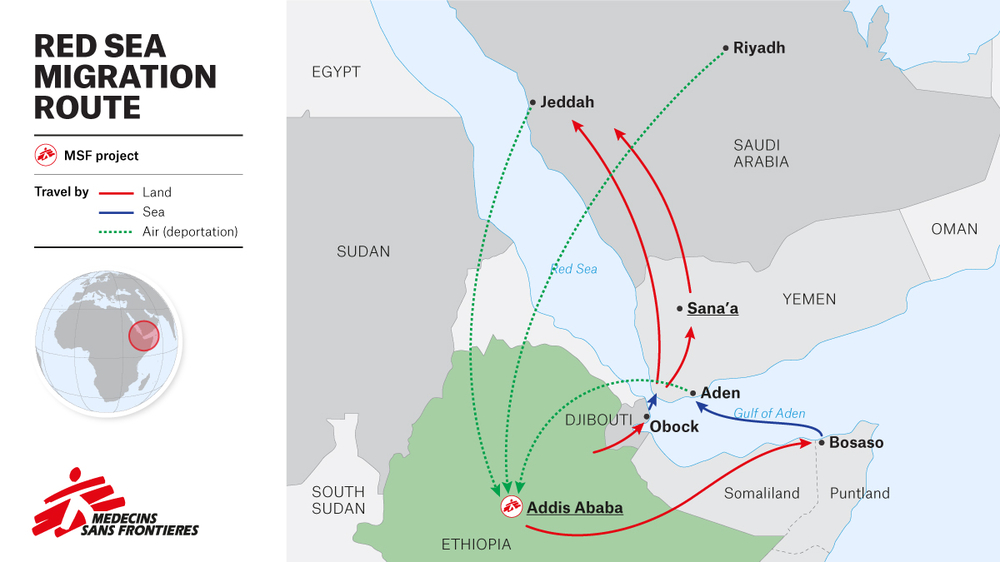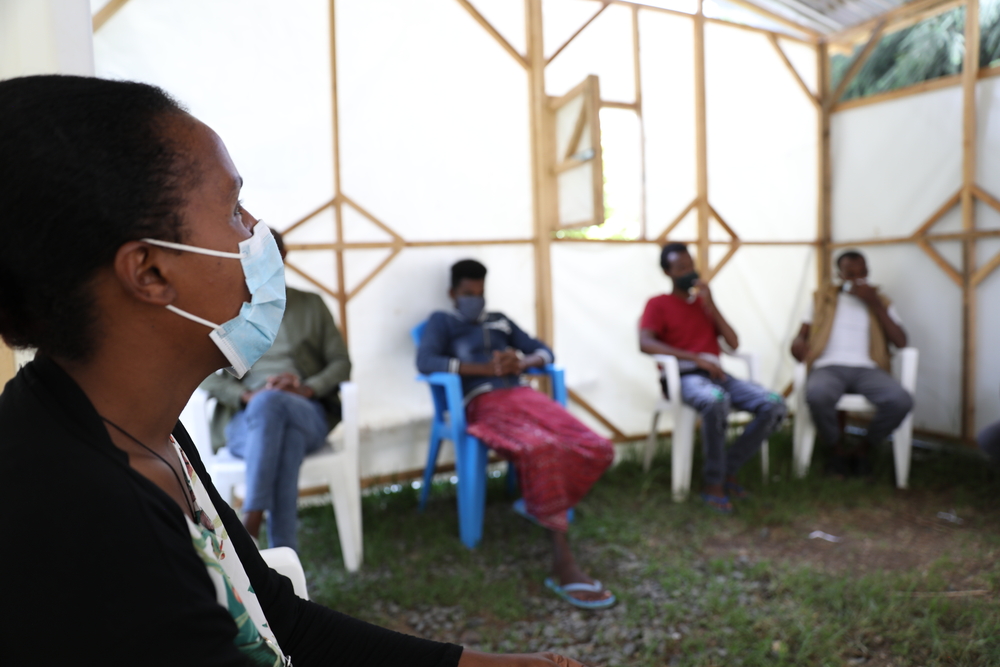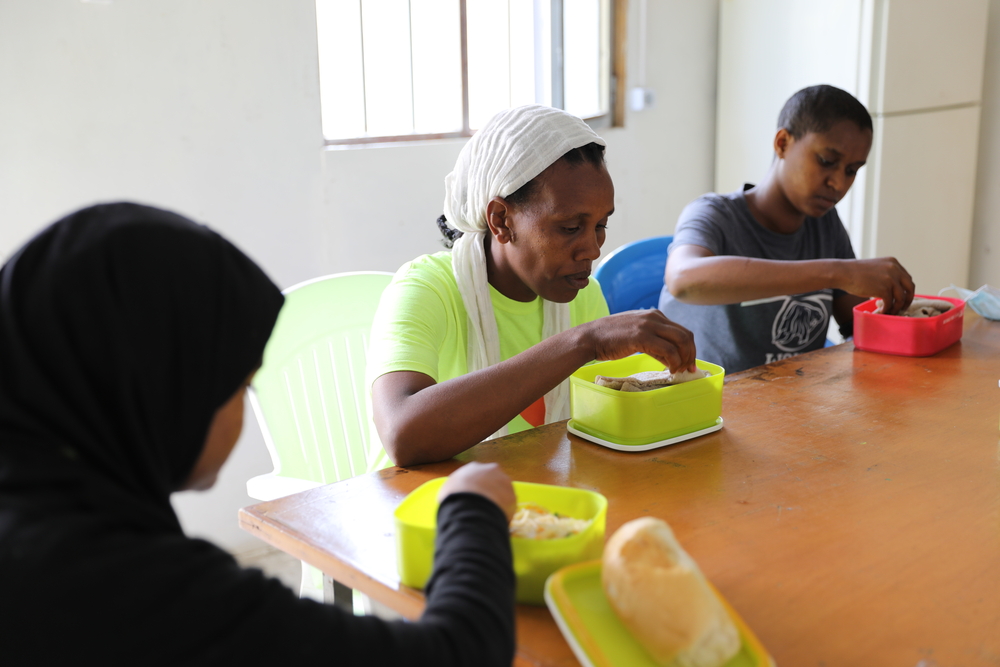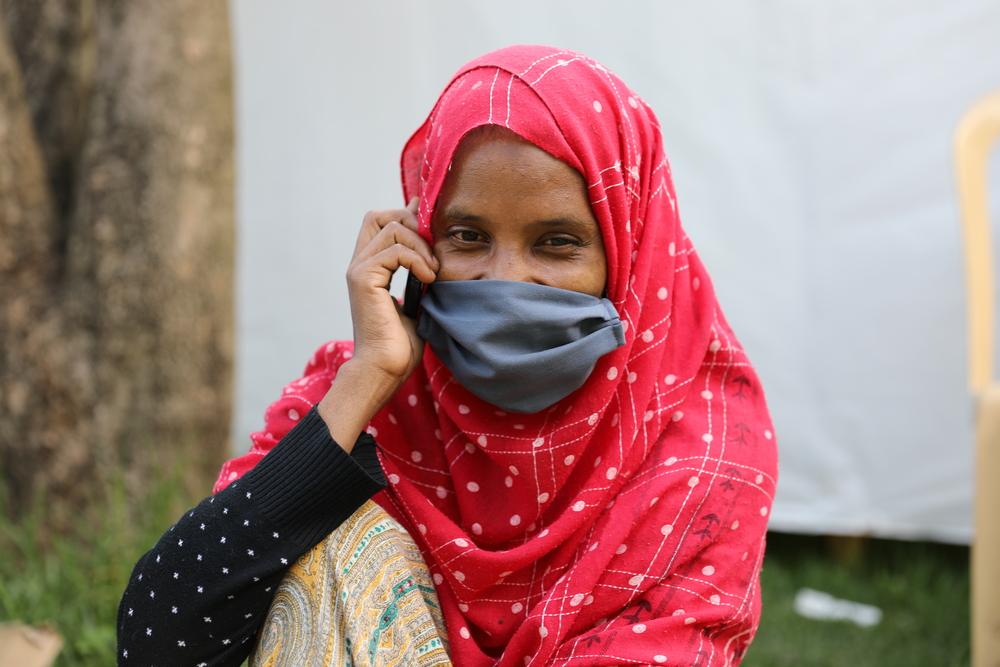Muntaha walks to a quiet spot outside and sits down in the grass. She pulls a small cell phone from her pocket and begins to dial. Even behind her mask, you can see the smile spread across her face as she hears the voice on the other end of the line. It’s been two years since Muntaha has seen her four children, and roughly a year since she’s been able to speak to them, so every phone call home still feels like a private celebration.
Muntaha was 28 years old when she left her children in the rural district of Kichicho in Ethiopia’s Amhara region. A single mother of four, she couldn’t find work in their rural community, and was no longer able to feed her family. Her friends, also facing slim job prospects, began telling her about ways to earn a good salary in Saudi Arabia. One by one, she watched them decide to start the journey north to find work.
Muntaha soon decided that migrating to a Gulf country like her friends was the only way to gain stability for her family. “My plan was to work there for a short time to earn enough money to open a shop back home so I could feed my children more easily,” she says. “If I had known what would happen, I would never have left to begin with.”

A dangerous journey by land and sea
Muntaha’s story is similar to thousands of Ethiopians who decide each year to make the perilous journey to Saudi Arabia or other Gulf countries, with the false hope of finding work for fair pay. While relatively unknown internationally, the route from the Horn of Africa through Yemen is one of the busiest migration routes in the world. Before the pandemic, around 12,000 people started on this dangerous passage every month, most – like Muntaha – coming from rural areas of Ethiopia’s Tigray, Amhara and Oromia regions.
Migrants typically pass through Djibouti or Somaliland by foot, then cross the Red Sea to the coast of Yemen, where they walk through a country at war to reach the border of Saudi Arabia. Along the way, many find themselves stranded in Yemen, or trapped by traffickers who extort money from their families. Those who make it to Saudi Arabia often continue to face violence and mistreatment. Since 2017, Saudi Arabia has been arresting undocumented migrants, detaining them in overcrowded and unhygienic conditions until they are deported back to their countries of origin. Before the pandemic, Saudi authorities deported around 10,000 Ethiopians each month.
At countless points on the route, smugglers and traffickers wait to entrap migrants, offering passage in exchange for hefty payments. “The traffickers are everywhere, all along the way,” remembers Muntaha. “Both choices are dangerous,” she explains, “if you say you will go with them, you will face rape and other mistreatment. But if you refuse, they will beat you or rape you.” Muntaha was determined to elude traffickers and make the journey on her own, but ultimately it was impossible. “I tried to escape from them until I reached the shore in Yemen,” she says, “but I couldn’t. So finally, I went with one of them.”
Little did Muntaha know that this would be the first of several traffickers she would be handed over to along her journey. Each one repeatedly asked for her family’s phone number to threaten them for money, beating her when she refused. In Yemen, she was abused by traffickers for one month before she was allowed to cross by foot to the border of Saudi Arabia. “People die trying to cross to Saudi,” she says, “I passed many dead bodies along the way.”
A worsening crisis
In 2020, the COVID-19 pandemic only compounded the trauma migrants face. Despite a drop in movements due to closed borders, still at least 37,535 migrants arrived in Yemen in 2020. Reports from returnees indicate that conditions along the route have deteriorated. Migrants face an even higher risk of violence, or find themselves stranded in unsafe situations without access to basic services, including healthcare.
While mass deportations were suspended for most of 2020, detention continued in both Yemen and KSA, resulting in migrants being held for extended periods of time. In the first quarter of 2021, more than sixty per cent of Ethiopian returnees from Saudi Arabia evaluated by Doctors Without Borders/Médecins Sans Frontières (MSF) had spent between 6 months and 1 year in detention. This is a dramatic increase from 2019, when the average length of detention was less than 3 months.
Muntaha was arrested in Saudi Arabia in 2020 and was taken to a detention center injured from her capture – with a fractured skull and wounded leg. “I was held there for seven months,” she recalls, “I kept asking them to take me to the hospital to change the dressings on my wounds. But no one would talk to me.”
These traumatic experiences take a heavy toll on the wellbeing of migrants. MSF teams are seeing people return in a worse state than in previous years, with significant medical and mental health needs. In the first three months of 2021, MSF provided 3,457 medical consultations and 832 individual mental health consultations to arriving returnees. They identified 380 patients with psychiatric symptoms - more than all the cases identified in 2019 and 2020 combined. The most common medical conditions remain those associated with overcrowded living conditions and lack of access to medical care, including skin diseases and respiratory infections. These concerning indicators are likely linked to the increasing dangers of the route, longer periods spent in detention, and ongoing experiences of mistreatment and abuse.
“We are concerned about the poor conditions that undocumented migrants face in detention. People should not be detained and it should be an exceptional measure of last resort for the shortest period possible, and only if justified by a legitimate purpose,” says Himedan Mohammed, MSF head of mission in Ethiopia. “Where migrants are detained, authorities in Ethiopia, Saudi Arabia, and other governments in the region need to ensure their safety and dignified treatment.”

Providing care to restore hope
Mass deportations resumed in October 2020 and are expected to continue increasing, with well over 10,000 Ethiopians deported from Saudi Arabia in the first quarter of 2021. Muntaha was sent back just a few weeks ago. Like the majority of returnees, she arrived at a special area at Bole International Airport in Addis Ababa, with no possessions and very little support to start a new life.
MSF teams working at this airport arrival point since March 2018, screen the medical condition of returnees, and refer severe cases to area hospitals. Since October 2020, MSF has also been working in several transit shelters in Addis, where returning migrants are transferred for just a few days before being sent onward to their home regions. MSF outreach teams visit these shelters regularly to provide medical and mental health care during their short stay.
While the Ethiopian government has made significant efforts to improve reception conditions for returning migrants, challenges and gaps remain. Shelter capacity for new arrivals is limited, and reception facilities are overcrowded, with inadequate measures in place to reduce the spread of communicable diseases, including COVID-19. In addition, services to identify and support vulnerable groups are undermined by the limited time migrants spend in the shelters. If the number of arrivals increases as expected throughout 2021, these gaps will only increase.
Upon arrival at the airport, returnees with mild to moderate mental health symptoms are referred to MSF’s therapeutic counselling center in Addis Ababa. Depending on their needs, migrants spend from a few days up to a month or more at the center, where they receive food, clothes, shelter, and assistance for transportation until they are ready to go home. MSF physicians provide care for injuries and other medical needs. In individual and group therapy sessions, MSF psychologists provide counseling, and empower patients with coping strategies to help them overcome common mental health symptoms, like post-traumatic stress disorder (PTSD), depression, anxiety, and insomnia. Simple activities like playing games, drawing, doing laundry, and having lunch together help patients reestablish a sense of normalcy and dignity.
Now 30 years old, Muntaha is one of fifteen patients currently being treated at the TCC. Here, she is finally receiving follow-up medical treatment for the injuries she sustained in Saudi Arabia. Through group and private sessions with MSF psychologists, she has started processing what she’s experienced, and learning how to manage her ongoing symptoms. Very soon, she will be ready to return to her home region. Upon their discharge, MSF connects patients to services in their area, and TCC staff continue to follow up with them remotely. “Now, I just miss my children,” says Muntaha, “so I want to go to them.”

An uncertain future
For other returnees, the prospect of returning home can come with a host of new fears and challenges. Having migrated out of pressure to earn money for their families, there can be much shame, and even stigma, around returning empty-handed. Some have caused their families to go into deeper debt to pay traffickers along the route, leaving their loved ones in an even worse financial situation than before they migrated. Beyond the pressures of unmet expectations, some deportees return home with mental health conditions that require ongoing care – a reality that some families or communities struggle to accept.
Support services for reintegration are limited at best, and non-existent in many areas. Ensuring continuity of medical and mental health care is also a significant challenge. There is little or no access to mental health services – including psychiatric care – outside of Addis Ababa, especially in remote areas of Ethiopia. Therefore, after patients are discharged, they face a high risk of relapsing. Lack of follow-up – especially for returnees with specific medical and social needs – not only compromises their access to vital health services and reintegration into the community, but also increases their risk of re-migration abroad. Many decide it’s better to try the journey again, once again exposing themselves to the same traumas.
For these reasons, MSF will soon expand its existing follow-up services for patients after they return home. The team at the TCC has already started accompanying particularly vulnerable patients back to their communities, helping to improve acceptance, ensure continued medical care, and facilitate their reintegration. TCC staff have seen first-hand the difference it makes when returnees receive support and resources, both on arrival and during their uncertain transition home. For many, it can be the deciding factor in whether they repeat this traumatic cycle of migration, detention, and deportation.
